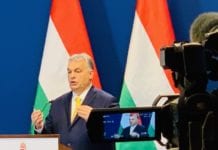By Stefan J. Bos, Chief International Correspondent BosNewsLife

BUDAPEST, HUNGARY (BosNewsLife)– A chief rabbi has condemned Hungarian government plans to establish a memorial for the victims of the 1944 German occupation of Hungary as it would send the message that “the Hungarian state had been blameless.”
Rabbi Slomó Köves, who leads the Unified Hungarian Jewish Congregation (EMIH), told BosNewsLife that the “blurring of historical facts is painful to us.”
The controversy comes at a time when the center-right government wants to commemorate both the 70th anniversary of German occupation of Hungary and the Hungarian Holocaust.
Those familiar with the plans say the large memorial includes Germany’s imperial eagle swooping down on the archangel Gabriel, who symbolizes Hungary.
Authorities say they want to unveil the statue in March on Budapest’s famed Freedom Square, near a Soviet war memorial, a statue of late American President Ronald Reagan and the U.S. embassy.
DOWNPLAYING RESPONSIBILITY
Köves said setting-up a memorial in central Budapest for occupation victims would downplay that Hungary had been a close ally of Nazi-Germany till March 1944.
He referred to anti-Jewish laws adopted under Hungarian regent Miklós Horthy that critics say contributed to an atmosphere of hatred and, eventually, the Holocaust in which 600,000 Hungarian Jews died.
Survivors recall that Hungarians enthusiastically participated in the persecution of fellow Jewish citizens. “Hungarians were eager to close the carriages of the death trains, ” said Nikolaus (Miklós) Grüner, who was among those transported as cattle in an overcrowded train from Hungary to the Auschwitz-Birkenau death camps.

“They destroyed our home in the town of Nyíregyháza, nearly exterminated my family and killed hundreds of thousands of other Jewish people,” Grüner told BosNewsLife.
The now 85-year-old survived, but his mother and younger brother were gassed immediately in the day-and-night working ovens of the Nazi complex. His father worked himself to death.
RECORDING STORIES
Rabbi Köves urged the government to support his congregation’s plans to record the stories of the remaining thousands of elderly Hungarian survivors of the Holocaust living in Hungary and to help them where necessary.
“It is important to emphasize that even 70 years after the Holocaust we have a heightened moral responsibility towards those, who were first robbed of their rights to education by the Horthy regime-sanctioned four anti-Jewish laws.”
He said they gradually lost their human rights, their belongings and means of existence, and many Jews were “finally deliberately sent to their deaths”. Even today, “the welfare situation of survivors is catastrophic,” Köves stressed.
“EMIH proposes the creation of a program in which the 7,764 survivors are provided the most meaningful interactive platforms possible to establish personal contact with the young generation. [We want to] assist them in working out their personal life stories and saving them for the future,” he explained.
“Hungary is the only country in Europe where a substantial community of survivors lives, whose members returned to their homeland after the Holocaust because they could envisage their future here. This is of enormous value but at the same time it makes facing up to the past more difficult,” the rabbi cautioned.
LITTLE TIME
He also noted there is little time left as most survivors, some 4,000, are older than 80.

The 34-year-old Köves, who was the first rabbi to be ordained in Hungary since the Holocaust, said there could be “no better moment than this anniversary to announce a museum for the thousand years of Hungary’s coexistence with Hungarian Jewry” to tackle rising antisemitism.
His views are shared by several Jewish leaders, who have threatened to boycott Holocaust ceremonies to protest the occupation memorial. The fractured leftist opposition has urged the government to remember the relative few Hungarians involved in the resistance.
The far-right Jobbik party supports government plans to set up a memorial for German occupation victims, but also demands the removal from central Budapest of a World War Two statue honoring Soviet soldiers.
The row has added to concerns over the political climate in Hungary, which prepares for elections on April 6, that are expected to be won by the right-wing Fidesz party of controversial Prime Minister Viktor Orbán.
WEST CONCERNED
Orbán allies triumphed with a two-thirds majority in parliament in the 2010 elections, allowing them to pass legislation that the international community said threatened previously independent institutions ranging from media, the Central Bank to even churches.
Several Western diplomats view Orbán, once a staunch anti-Communist, as a nationalist who has become increasingly autocratic.
German Chancellor Angela Merkel last year told Hungary that European Union member states’ were concerned about Hungary’s controversial constitution, which went into effect in 2012.
The constitution, which was supported only by Orban’s ruling party, Hungary lost its sovereignty after the German invasion and regained it only after the 1990 end of communism.

Critics view the wording as an attempt to diminish the role of Hungarians in the Holocaust as Hungary had long supported Nazi-Germany.
‘NEW INVASION’
Orbán compared German criticism of Hungarian democracy to the Nazi invasion of his country in World War Two.
He also said “Brussels was not Moscow” a reference to the era when Hungary was a Soviet-satellite state.
Yet, amid international pressure, some government officials have slowly acknowledged Hungarians’ role in the Holocaust. In October, Deputy Prime Minister Tibor Navracsics told a conference that Hungarians were responsible for the massive killing of Jews.
He made clear that under the Communist previous regime his generation was taught at school that Regent Miklós Horthy’s fascists were responsible for the Holocaust. “Only [after the collapse of Communism] in 1990 we learned that the Hungarian state was itself responsible.”
Hungary, which joined the EU in 2004, is host to more than 100,000 Hungarian Jews, the largest Jewish community in Eastern Europe outside Russia.
(BosNewsLife, the first truly independent news agency covering persecuted Christians, is ‘Breaking the News for Compassionate Professionals’ since 2004).
Please help BosNewsLife to be the voice of the voiceless, also this New(s) Year . Click here for a subscription.
Follow BosNewsLife via Twitter








